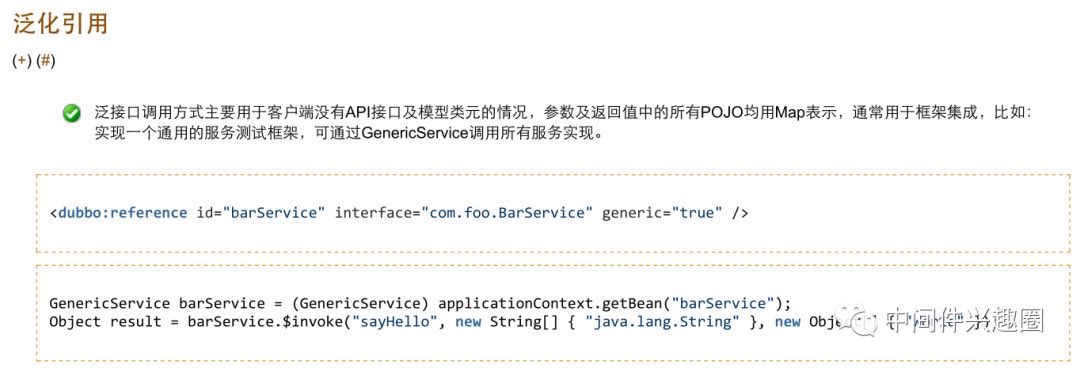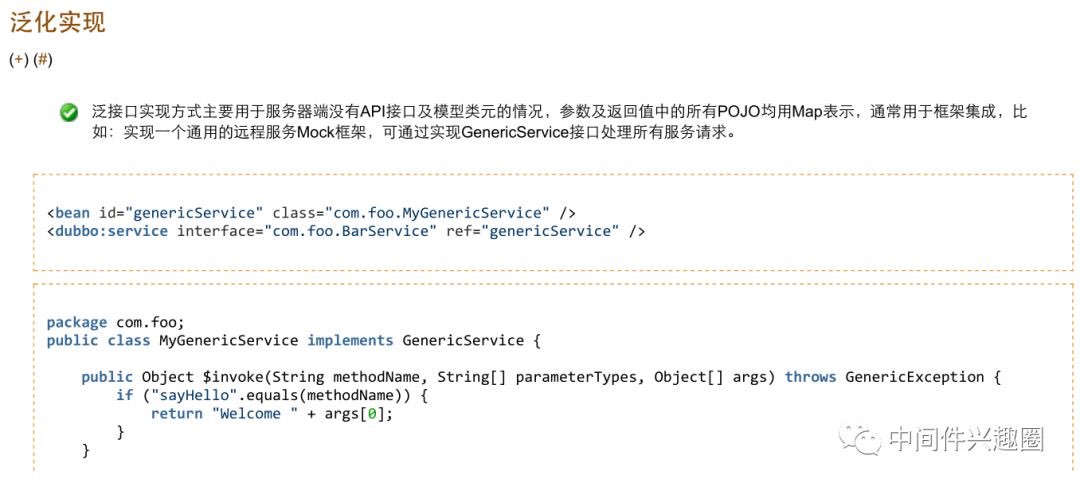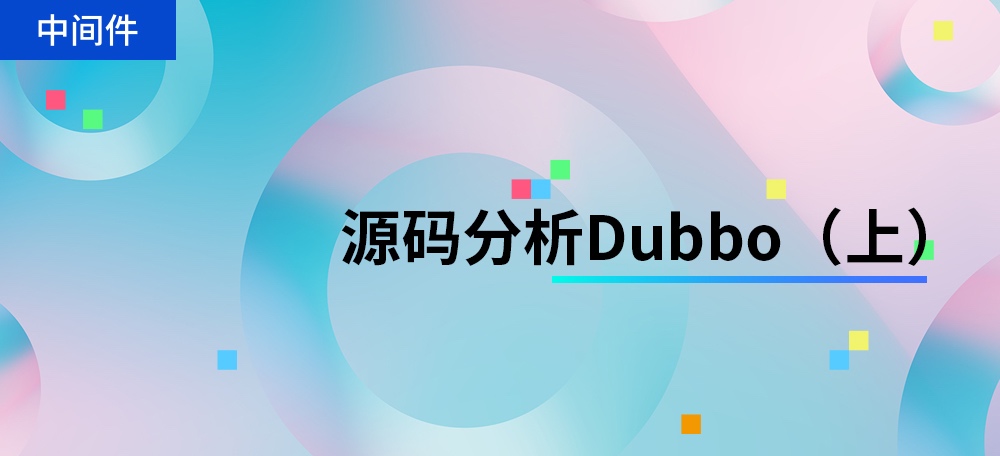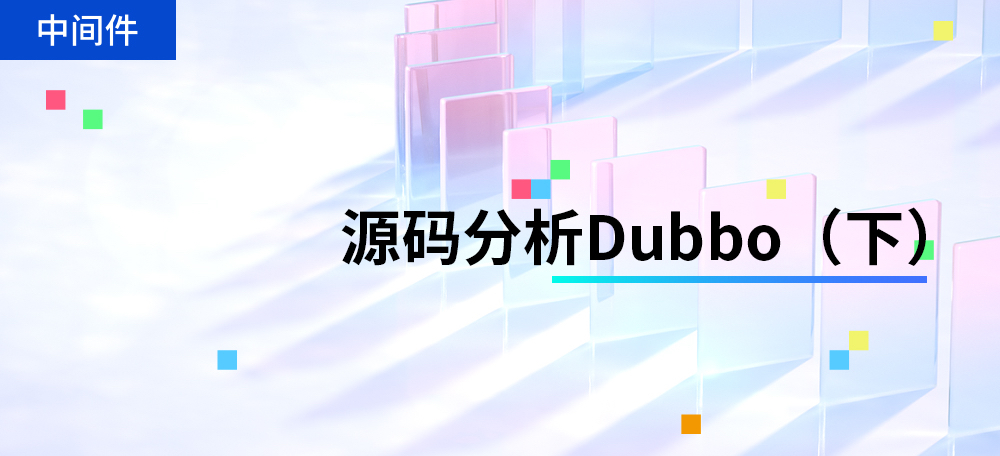源码分析Dubbo 泛化调用与泛化实现原理原创
本文将重点分析Dubbo的两个重要特性:泛化调用与泛化实现。
泛化引用:
通常是服务调用方没有引入API包,也就不包含接口中的实体类,故服务调用方只能提供Map形式的数据,由服务提供者根据Map转化成对应的实体。
泛化实现
泛化实现,是指服务提供者未引入API包,也就不包含接口用于传输数据的实体类,故客户端发起调用前,需要将mode转化为Map。
从上面分析,其实所谓的泛化本质上就是Map与Bean的转换。
GenericImplFilter实现原理
1public Result invoke(Invoker<?> invoker, Invocation invocation) throws RpcException {
2 String generic = invoker.getUrl().getParameter(Constants.GENERIC_KEY);
3 if (ProtocolUtils.isGeneric(generic) // @1
4 && !Constants.$INVOKE.equals(invocation.getMethodName())
5 && invocation instanceof RpcInvocation) {
6 RpcInvocation invocation2 = (RpcInvocation) invocation;
7 String methodName = invocation2.getMethodName();
8 Class<?>[] parameterTypes = invocation2.getParameterTypes();
9 Object[] arguments = invocation2.getArguments();
10
11 String[] types = new String[parameterTypes.length];
12 for (int i = 0; i < parameterTypes.length; i++) {
13 types[i] = ReflectUtils.getName(parameterTypes[i]);
14 }
15
16 Object[] args;
17 if (ProtocolUtils.isBeanGenericSerialization(generic)) {
18 args = new Object[arguments.length];
19 for (int i = 0; i < arguments.length; i++) {
20 args[i] = JavaBeanSerializeUtil.serialize(arguments[i], JavaBeanAccessor.METHOD);
21 }
22 } else {
23 args = PojoUtils.generalize(arguments);
24 }
25
26 invocation2.setMethodName(Constants.$INVOKE);
27 invocation2.setParameterTypes(GENERIC_PARAMETER_TYPES);
28 invocation2.setArguments(new Object[]{methodName, types, args});
29 Result result = invoker.invoke(invocation2);
30
31 if (!result.hasException()) {
32 Object value = result.getValue();
33 try {
34 Method method = invoker.getInterface().getMethod(methodName, parameterTypes);
35 if (ProtocolUtils.isBeanGenericSerialization(generic)) {
36 if (value == null) {
37 return new RpcResult(value);
38 } else if (value instanceof JavaBeanDescriptor) {
39 return new RpcResult(JavaBeanSerializeUtil.deserialize((JavaBeanDescriptor) value));
40 } else {
41 throw new RpcException(
42 "The type of result value is " +
43 value.getClass().getName() +
44 " other than " +
45 JavaBeanDescriptor.class.getName() +
46 ", and the result is " +
47 value);
48 }
49 } else {
50 return new RpcResult(PojoUtils.realize(value, method.getReturnType(), method.getGenericReturnType()));
51 }
52 } catch (NoSuchMethodException e) {
53 throw new RpcException(e.getMessage(), e);
54 }
55 } else if (result.getException() instanceof GenericException) {
56 GenericException exception = (GenericException) result.getException();
57 try {
58 String className = exception.getExceptionClass();
59 Class<?> clazz = ReflectUtils.forName(className);
60 Throwable targetException = null;
61 Throwable lastException = null;
62 try {
63 targetException = (Throwable) clazz.newInstance();
64 } catch (Throwable e) {
65 lastException = e;
66 for (Constructor<?> constructor : clazz.getConstructors()) {
67 try {
68 targetException = (Throwable) constructor.newInstance(new Object[constructor.getParameterTypes().length]);
69 break;
70 } catch (Throwable e1) {
71 lastException = e1;
72 }
73 }
74 }
75 if (targetException != null) {
76 try {
77 Field field = Throwable.class.getDeclaredField("detailMessage");
78 if (!field.isAccessible()) {
79 field.setAccessible(true);
80 }
81 field.set(targetException, exception.getExceptionMessage());
82 } catch (Throwable e) {
83 logger.warn(e.getMessage(), e);
84 }
85 result = new RpcResult(targetException);
86 } else if (lastException != null) {
87 throw lastException;
88 }
89 } catch (Throwable e) {
90 throw new RpcException("Can not deserialize exception " + exception.getExceptionClass() + ", message: " + exception.getExceptionMessage(), e);
91 }
92 }
93 return result;
94 }
95
96 if (invocation.getMethodName().equals(Constants.$INVOKE) // @2
97 && invocation.getArguments() != null
98 && invocation.getArguments().length == 3
99 && ProtocolUtils.isGeneric(generic)) {
100
101 Object[] args = (Object[]) invocation.getArguments()[2];
102 if (ProtocolUtils.isJavaGenericSerialization(generic)) {
103
104 for (Object arg : args) {
105 if (!(byte[].class == arg.getClass())) {
106 error(byte[].class.getName(), arg.getClass().getName());
107 }
108 }
109 } else if (ProtocolUtils.isBeanGenericSerialization(generic)) {
110 for (Object arg : args) {
111 if (!(arg instanceof JavaBeanDescriptor)) {
112 error(JavaBeanDescriptor.class.getName(), arg.getClass().getName());
113 }
114 }
115 }
116
117 ((RpcInvocation) invocation).setAttachment(
118 Constants.GENERIC_KEY, invoker.getUrl().getParameter(Constants.GENERIC_KEY));
119 }
120 return invoker.invoke(invocation);
121 }
-
代码@1:该分支是泛化实现,如果是泛化实现,则根据generic的值进行序列化,然后调用$invoke方法,因为服务端实现为泛化实现,所有的服务提供者实现GenericeServer#$invoker方法,其实现方式就是将Bean转换成Map。这些细节将在服务端GenericFilter序列中详细讲解。
-
代码@2:泛化引用,调用方是直接通过GenericService#$invoke方法进行调用,以此来区分是泛化调用还是泛化引用,那不经要问,为什么invoker.getUrl().getParameter(Constants.GENERIC_KEY)中获取的generic参数到底是< dubbo:service/>中配置的还是< dubbo:reference/>中配置的呢?其实不难理解:
-
dubbo:servcie未配置而dubbo:reference配置了,则代表的是消费端的,必然是泛化引用。
-
dubbo:servcie配置而dubbo:reference未配置了,则代表的是服务端的,必然是泛化实现。
如果两者都配置了,generic以消费端为主。消费端参数与服务端参数的合并在服务发现时,注册中心首先会将服务提供者的URL通知消费端,然后消费端会使用当前的配置与服务提供者URL中的配置进行合并,如遇到相同参数,则消费端覆盖服务端。
注:这里我就不深入去探讨其实现细节,因为这部分在下文源码分析GenericFilter时会详细介绍Map与Bean转换的细节,包含是否序列化,之所以这里没有细说,主要是因为我先看的是GenericFilter。
GenericFilter实现原理
1@Activate(group = Constants.PROVIDER, order = -20000)
2public class GenericFilter implements Filter {
3 @Override
4 public Result invoke(Invoker<?> invoker, Invocation inv) throws RpcException {
5 if (inv.getMethodName().equals(Constants.$INVOKE)
6 && inv.getArguments() != null
7 && inv.getArguments().length == 3
8 && !ProtocolUtils.isGeneric(invoker.getUrl().getParameter(Constants.GENERIC_KEY))) { // @1
9 String name = ((String) inv.getArguments()[0]).trim();
10 String[] types = (String[]) inv.getArguments()[1];
11 Object[] args = (Object[]) inv.getArguments()[2];
12 try {
13 Method method = ReflectUtils.findMethodByMethodSignature(invoker.getInterface(), name, types); // @2
14 Class<?>[] params = method.getParameterTypes();
15 if (args == null) {
16 args = new Object[params.length];
17 }
18 String generic = inv.getAttachment(Constants.GENERIC_KEY);
19 if (StringUtils.isEmpty(generic)
20 || ProtocolUtils.isDefaultGenericSerialization(generic)) { // @3
21 args = PojoUtils.realize(args, params, method.getGenericParameterTypes());
22 } else if (ProtocolUtils.isJavaGenericSerialization(generic)) { // @4
23 for (int i = 0; i < args.length; i++) {
24 if (byte[].class == args[i].getClass()) {
25 try {
26 UnsafeByteArrayInputStream is = new UnsafeByteArrayInputStream((byte[]) args[i]);
27 args[i] = ExtensionLoader.getExtensionLoader(Serialization.class)
28 .getExtension(Constants.GENERIC_SERIALIZATION_NATIVE_JAVA)
29 .deserialize(null, is).readObject();
30 } catch (Exception e) {
31 throw new RpcException("Deserialize argument [" + (i + 1) + "] failed.", e);
32 }
33 } else {
34 throw new RpcException(
35 "Generic serialization [" +
36 Constants.GENERIC_SERIALIZATION_NATIVE_JAVA +
37 "] only support message type " +
38 byte[].class +
39 " and your message type is " +
40 args[i].getClass());
41 }
42 }
43 } else if (ProtocolUtils.isBeanGenericSerialization(generic)) { // @5
44 for (int i = 0; i < args.length; i++) {
45 if (args[i] instanceof JavaBeanDescriptor) {
46 args[i] = JavaBeanSerializeUtil.deserialize((JavaBeanDescriptor) args[i]);
47 } else {
48 throw new RpcException(
49 "Generic serialization [" +
50 Constants.GENERIC_SERIALIZATION_BEAN +
51 "] only support message type " +
52 JavaBeanDescriptor.class.getName() +
53 " and your message type is " +
54 args[i].getClass().getName());
55 }
56 }
57 }
58 Result result = invoker.invoke(new RpcInvocation(method, args, inv.getAttachments())); // @6
59 if (result.hasException()
60 && !(result.getException() instanceof GenericException)) {
61 return new RpcResult(new GenericException(result.getException()));
62 }
63 if (ProtocolUtils.isJavaGenericSerialization(generic)) { // @7
64 try {
65 UnsafeByteArrayOutputStream os = new UnsafeByteArrayOutputStream(512);
66 ExtensionLoader.getExtensionLoader(Serialization.class)
67 .getExtension(Constants.GENERIC_SERIALIZATION_NATIVE_JAVA)
68 .serialize(null, os).writeObject(result.getValue());
69 return new RpcResult(os.toByteArray());
70 } catch (IOException e) {
71 throw new RpcException("Serialize result failed.", e);
72 }
73 } else if (ProtocolUtils.isBeanGenericSerialization(generic)) {
74 return new RpcResult(JavaBeanSerializeUtil.serialize(result.getValue(), JavaBeanAccessor.METHOD));
75 } else {
76 return new RpcResult(PojoUtils.generalize(result.getValue()));
77 }
78 } catch (NoSuchMethodException e) {
79 throw new RpcException(e.getMessage(), e);
80 } catch (ClassNotFoundException e) {
81 throw new RpcException(e.getMessage(), e);
82 }
83 }
84 return invoker.invoke(inv);
85 }
86}
- 代码@1:如果方法名为$invoker,并且只有3个参数,并且服务端实现为非返回实现,则认为本次服务调用时客户端泛化引用服务端,客户端的泛化调用,需要将请求参数反序列化为该接口真实的pojo对象。
- 代码@2:根据接口名(API类)、方法名、方法参数类型列表,根据反射机制获取对应的方法。
- 代码@3:处理普通的泛化引用调用,即处理,只需要将参数列表Object[]反序列化为pojo即可,具体的反序列化为PojoUtils#realize,其实现原理如下:
在JAVA的世界中,pojo通常用map来表示,也就是一个Map可以用来表示一个对象的值,那从一个Map如果序列化一个对象呢?其关键的要素是要在Map中保留该对象的类路径名。例如现在有这样一个对象:
1public class Student {
2 private int id;
3 private String name;
4 private Team team;
5 //省略get set方法
6}
7public class Team {
8 private int id;
9 private String name;
10 // 省略其他属性与set get方法
11}
12用Map表示Student为:
13{
14 “class”:"somepackeage.Student",
15 "id":1,
16 "name":"dingw",
17 "team":
18 {
19 "class" : "somepackage.Team",
20 "id":2,
21 "name":"t"
22 }
23}
也就是通过class来标识该Map需要反序列化的pojo类型。
- 代码@4:处理< dubbo:reference generic=“nativejava” /> 启用泛化引用,并使用nativejava序列化参数,在服务端这边通过nativejava反序列化参数成pojo对象。
- 代码@5:处理< dubbo:reference generic=“bean” /> 启用泛化引用,并使用javabean序列化参数,在服务端这边通过javabean反序列化参数成pojo对象。
- 代码@6:序列化API方法中声明的类型,构建new RpcInvocation(method, args, inv.getAttachments())调用环境,继续调用后续过滤器。
- 代码@7:处理执行结果,如果是nativejava或bean,则需要对返回结果序列化,如果是generic=true,则使用PojoUtils.generalize序列化,也即将pojo序列化为Map。
泛化调用与泛化引用,就介绍到这里了。






